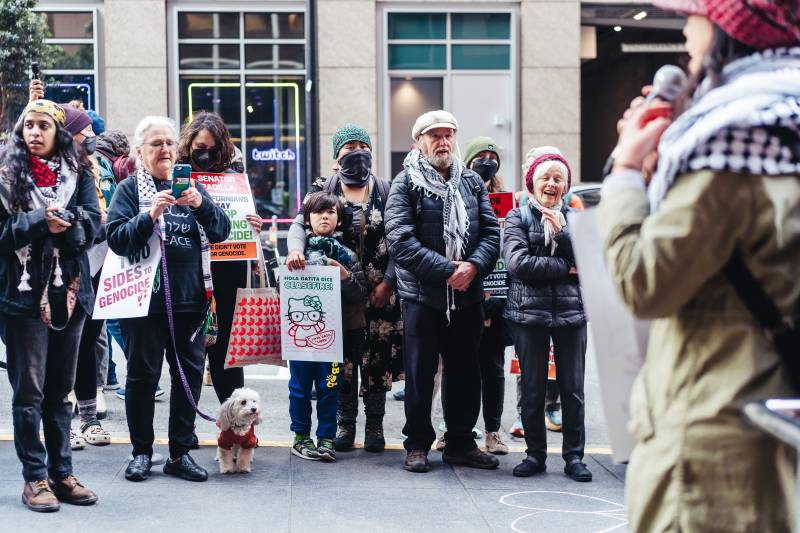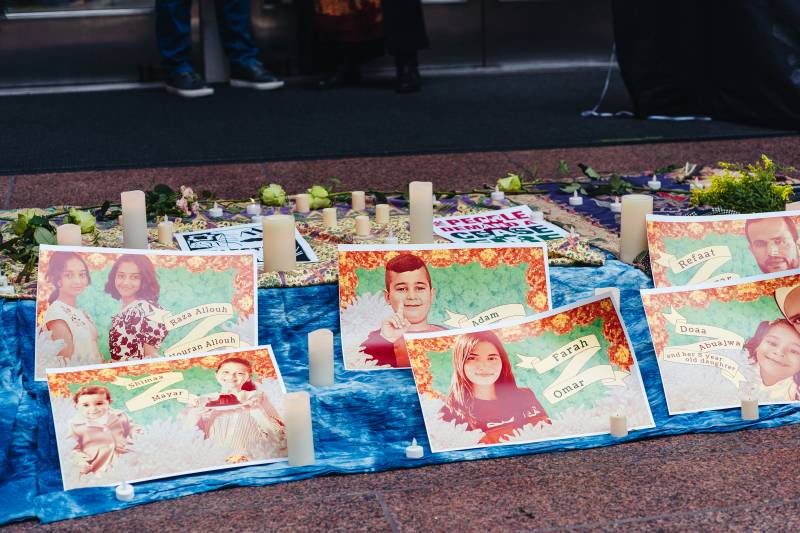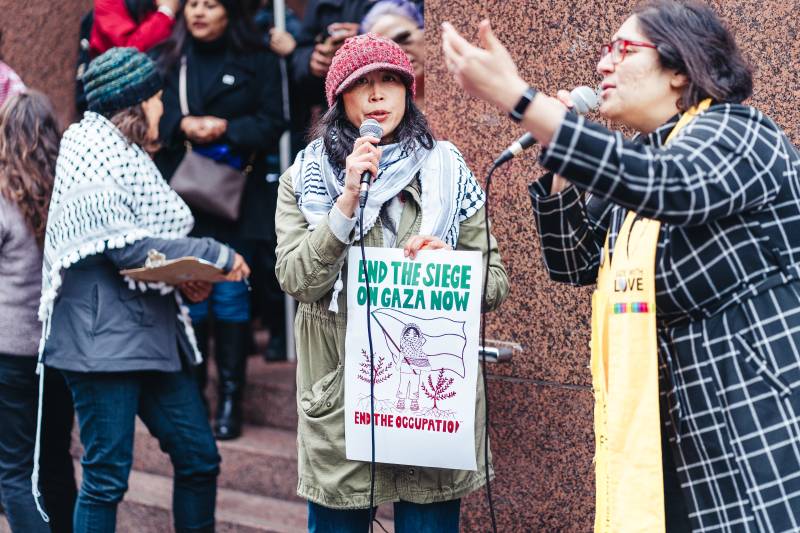View the full episode transcript.
Hello dear reader, thanks for lending me your attention. These last six months, our world has borne witness to the ongoing violence in Gaza, where Israel has been accused of “engaging in genocidal acts against the Palestinian people in Gaza,” according to a case filed by South Africa in the UN’s International Court of Justice.
My colleagues have reported on this siege and the ways it is impacting our communities here in the Bay Area (here and here to name a few). So as not to belabor their work, I want to direct your attention to a collective of dissenters who haven’t been covered much in the media.
This collective, Mamas for a Free Palestine, is made up of mothers across the Bay Area who say they are fed up with business as usual. While they are a relatively new group, these mothers are not new to activism and political organizing.

In December 2023 and February 2024, Mamas for a Free Palestine organized alongside Eastbay for Ceasefire Now to rally rank and file workers across various unions and social justice organizations like Arab Resource & Organizing Center (AROC), Jewish Voice for Peace (JVP), and People Organizing to Demand Environmental and Economic Rights (PODER) to demand that elected officials declare a permanent ceasefire in Gaza and end usage of U.S. dollars for Israel’s military.

They say they want elected officials to support humanitarian aid for Gaza immediately and fund community needs like healthcare and affordable housing.
If you’ve stayed this long, I hope you will stay longer to listen to our episode and hear the voices of mamas calling for a future that centers caring, not bombing.
Editor’s note: This episode has been edited in accordance with KQED’s editorial guidelines and Code of Ethics.
Episode Transcript
Marisol Medina-Cadena, host: As of this recording, we are about five months into the bombardment of Gaza, including the targeting of hospitals, schools and libraries. The world has seen the results: Massive displacement, death, and starvation. And nearly 100 journalists killed. That being said, I don’t want to use this precious time that I have your attention, to spotlight human-made calamities, that I’m sure you are aware of.
[Music]
Marisol Medina-Cadena: Instead, I want to direct your attention to a collective of people who are using their voices to bring attention to what’s happening in Gaza, and to bear witness to the humanity of the Palestinian people whose homes and bodies are under siege.
On this episode of Rightnowish, we’ll visit a local protest organized by a group of Bay Area mothers and learn why this wasn’t your average protest.
[Crowd singing]
Marisol Medina-Cadena: I’m Marisol Medina-Cadena. Stay with us.
[Music]
Marisol Medina-Cadena: Back in December of 2023, I heard about a collective called “Mamas for a Free Palestine”. They don’t have an online presence so I decided to go to one of their actions in San Francisco’s Financial District to learn more
[Crowd sings a call and response song: “Not in our name/ Not in our name/ Stop the genocide/ Stop the genocide…” ]
Marisol Medina-Cadena: Walking up Montgomery Street I followed chanting to 333 Bush Street— the SF office of Senator Alex Padilla.
Prior to the action, Mamas for a Free Palestine along with a larger coalition called East Bay For Ceasefire Now sent a letter to Senator Padilla expressing their grief over the loss of life and urging him to call for an immediate ceasefire.
[Crowd sings,“We breathe together, Stop the occupation” ]
Marisol Medina-Cadena: Since they say they weren’t given a chance to dialogue with the senator, they staged an action at his office both inside the lobby and on the outdoor public steps.
Inside, I saw religious leaders of Jewish, Catholic, and Muslim faith wearing their clerical attire. They stood behind the rest of the protesters who were either sitting in wheelchairs or sitting directly on the floor. The lobby staff looked nervous but respectful of the protest. Individuals who worked inside the building awkwardly moseyed in trying not to step on protestors while getting to the elevator. Some looked empathetic, concerned, curious. Others looked aggravated. I saw someone push a protestor as they walked by.
After 40 minutes of speeches, singing, and call and response chants, the organizers informed everyone that the inside action would end and folks should join the outside rally.
I followed them out.
Gayla King, speaking to the crowd: I now want to introduce our healer in our community, Angela Angel, who will share the grief ritual that we are about to…
Marisol Medina-Cadena: Outside, the energy shifted from indignation to sobering reverence. A grief ritual was now unfolding
Angela Angel, speaking to the crowd: And so today we do this to honor all of these families. We do this to mourn with them. We know that with our fight also comes with tenderness and honoring the sacred.
Marisol Medina-Cadena: Three people dressed in all black carefully dipped their palms into buckets of red paint and pressed their handprints on the sidewalk altar, for all to see.
Meanwhile, the speaker read from a list of names of the thousands of Palestinian children killed so far in Gaza.
Angela Angel, speaking to the crowd: Yasmine Ramez Abdel Razzaq El Masry, a newborn, Aisha Jihad Jalal Shaheen, a newborn…
Marisol Medina-Cadena: According to a recent UNICEF report, the death toll is now over 11,000 children.
To the left of me, a woman and her young son were holding flowers, waiting in line to lay them down on the sidewalk altar. The mom started to cry and her child looked up at her with a look I recognized in my younger self… It’s a look of shock and fear that the adults in your life are capable of suffering. I surmised that because as a young kid, my parents took me to rallies and vigils.
This made me reflect on how some kids of color aren’t spared the harshness of this country. Our parents tell us about colonialism, police violence, and deportations because they have no choice. They’re trying to protect us.
Angela Angel, speaking to the crowd: We also want to pray for protection, not only for ourselves right now, as we do this work and dissent, we also want to pray for the protection, continued protection of Palestine. And so put those in your prayers right now and stay close to the earth, let the earth source you for this fight.
[Another organizer reads more names of martyred children. The crowd responds in spanish by saying “presente,” meaning “here.”]
Marisol Medina-Cadena: As the long list of dead children’s names comes to a close, different organizers get on the mic to make their call to action heard. I then notice some folks gathering over a table of warm empanadas and hot chai. I make my way over and learn that it’s the People’s Kitchen Collective who are providing this free food.
At this point, I’m still itching to speak with an organizer one on one. I found someone with ‘East Bay for Ceasefire Now’ which is the larger coalition behind all this. Here’s Isa Flores-Jones explaining her message to Senator Padilla:
Isa Flores Jones: We’re out here to say not in our names, not with our tax dollars. We don’t consent to that. We want our senators, our California senators to stand with their constituents and say, not one dime more. [car horn honks in support]
Isa Flores Jones: Everybody is just out here as rank and file workers, as baristas, as housekeepers, as the folks who who are working in the city and across the East Bay to just call on Senator Padilla to please stop funding this genocide, to put an end to the U.S. tax dollars that are flowing to to these deaths instead of to critical services that we need so badly in the Bay and across California.
We feel as if our concerns are just not not being heard and that the senator just doesn’t doesn’t fully understand the extent to which his constituents are impacted seeing every single day the thousands and thousands of men, women and children who are being killed in Gaza and that we stand against it.
Marisol Medina-Cadena: From the stage, I hear one of the Mamas speak to the crowd.
Mamas for a Free Palestine Organizer, speaking to the crowd: The Palestinian people of his constituency here in the state are devastated [car horn honking in support] by the loss and destruction [supporters honking car horns] in their homeland. And with the overwhelming majority of people around the globe who know that this continued attacks and atrocities will not make the world safe. They will not make the world safer. They may, for a brief moment, make someone more comfortable thinking that safety comes like this. But it does never come from bombs. It never comes in this way. And so we are here to say spend that money on life. [crowd cheers] Spend that money on the Palestinian people in reclaiming their land! [crowd cheers] The olive trees. The birds! The rivers! [crowd cheers]
Marisol Medina-Cadena: Isa then introduces me to another organizer who can speak to more of my questions. Gayla King is part of Mamas for a Free Palestine, and I asked her if there was a precedent for moms, at least in the Bay Area or California, protesting around militarism abroad:
Gayla King: Yes, absolutely. I think I’m definitely here following a lineage of mamas, of women, of feminine energy and power that have been leading these movements throughout time, throughout um, throughout the globe. There’s been a huge um anti militarization movement led by women that has been connecting different struggles across, across the continent.
For me, I am a daughter of an immigrant from the Philippines. But my mother was actually born in the Philippines during the time of World War II, when the U.S. was bombing her hometown, aimed at Japanese occupation but harming community, harming people, harming her family. And many of us have this lineage, right, of how a U.S. war machine impacts the homelands of our ancestors, of our people, bringing us here in very much the same way as what’s happening in Palestine, with Israel being backed by the United States and harming the people, killing the people, dropping the bombs.
And it’s the mothers. It’s the mothers that are resisting. It’s the mothers that are holding the grief, that are trying to protect their children, that are trying to protect their community.
The Mamas for a Free Palestine, while we’re a relatively new kind of collective of coming together post-October 7th but many of us have been involved in many movements for decades. And so I think we really just wanted to have a space where we could show up as mamas in our full holistic self to be able to grieve together, to heal together, to feed each other and to really be fierce in our resistance and in our deep solidarity for Palestine.
Marisol Medina-Cadena: What kind of questions is your kid asking you about this moment?
Gayla King: I have two young boys, 11 and 14, and they’re trying to understand. We have family, friends who are Palestinian that they’ve spent time with, and they know. They’ve heard the stories of what it’s been like for our friends growing up in the West Bank and so they’re really struggling with understanding how this can happen. Like, you know, why, why are we supporting this? Why is the U.S. government supporting this?
And they also have really, you know, close friends that are of Jewish faith and that they’re trying to grapple with this issue and understanding how the state of Israel, you know, is claiming to be a space for Jewish people but the Jewish friends they know and love don’t believe in bombs and don’t believe in what’s happening. So they’re asking a lot of questions and they’re grieving, too, because they are hearing and seeing of what’s happening.
Marisol Medina-Cadena: Have they said anything like if their teachers are holding space for them or for their emotions?
Gayla King: It doesn’t sound like it’s being held in the space that my 11 year old is in, at least not by the teachers. My 14 year old, who is in high school, he’s had a few teachers that have both done a teach-in on Palestine and that he’s also seen at some of the actions. So that’s been really important to him to see other adults who care about this issue taking a stand and bringing it into the school.
[Music]
Gayla King: There are such beautiful spaces that we’re creating together that our children can very much be a part of because our children can hold so much with us. They can hold the grief. And they can, we’re singing together. We’re eating together. We’re taking care of each other. And that’s what we also know is important for this movement to survive and to be sustained is that it has to be done centering our children and our families so that we can be in it for the long haul, yeah.
[Music]
Marisol Medina-Cadena: Gayla told me the Mamas plan to keep organizing till a permanent ceasefire is reached. So, on Presidents Day, they and other groups showed up again. This time at the plaza outside of Senator Laphonza Butler’s SF office to ask her to call for a ceasefire and the divestment of the 14 billion aid package Congress approved for Israel’s military.
And beyond banners and signs, the organizers brought a banquet table and set up chairs around it, essentially saying, ‘since you won’t invite us to the table to discuss, we brought our own table to host you.’
Later that night, Senator Butler was moderating a book talk at the Commonwealth Club in San Francisco. The talk was on the politics of adoption and reproductive justice. So, the mama’s showed up there too, to call attention to what they see as the hypocrisy of the Democratic establishment championing the right to choose yet staying quiet when it comes to safety for pregnant women and kids in Gaza.
Fifty of the mamas bought tickets to the event and attended. Halfway through the program they staged what they call a “rolling interruption” whereby a group of them stood up and sang a song adapted from a Palestinian poem.
Then one by one staggering their interruptions, the mamas declared why they felt as mothers obligated to speak up and demand Senator Butler to call for a ceasefire as well as an end to U.S. military aid to Israel.
After each mama made their verbal provocation, they were escorted out the venue. From the stage, Senator Butler acknowledged that protest is a part of democracy and that there’s room for expression and differing opinions, but she did not call for a ceasefire.
Hedieh Matinrad: My name is Hedieh Matinrad. It’s spelled…
Marisol Medina-Cadena: Two weeks after the action, I spoke on the phone with one of the Mamas to get her reflections on the evening that Senator Butler spoke.
Hedieh Matinrad: And certainly ya know, she said that her heart goes out too, for all lives lost. And that is great and not enough. We were being so clear that the first step is to stop the bombs from dropping, for a ceasefire to happen.
Marisol Medina-Cadena: There could be a lot of emotions, a lot of adrenaline, a lot of… I don’t know. I’m wondering, like, what was running in your head, like, moments, seconds, minutes before you raised your voice?
Hedieh Matinrad: This has been going on, this massacre in Gaza for many months. My baby was born a month before the offense began, and now he’s six months old.
A lot of my work as a palliative care doctor where I care for people with serious illness, like cancer a lot of times, is to help alleviate their suffering. And I think it really shakes me to my core, the unnecessary manufactured suffering that Palestinians in Gaza of all ages, everybody is being forced to live through. And I just, I see it as part of my mission in life, to be speaking out against this unnecessary suffering.
Because Palestinian children deserve to live. Just like my child deserves to live.
[Music]
Marisol Medina-Cadena: Caring for the collective good of children and families is what brought these mothers together. Their protests are intended to disrupt business as usual by reminding everyone not to get comfortable with the devastation happening… because they say, their love knows no borders.
Big big thank you to the organizers who trusted me and spoke to me for this episode.
It was produced and hosted by me, Marisol Medina-Cadena.
Patiently edited by Chris Hambrick and Jen Chien.
Expertly engineered by Christopher Beale and Brendan Willard.
Lovingly supported by Rightnowish team members Sheree Bishop and Pendarvis Harshaw.
Additional support provided by Katie Sprenger, Cesar Saldaña, Ugur Dursun and Holly Kernan.
You’ve been listening to Rightnowish, a KQED Production.

Rightnowish is an arts and culture podcast produced at KQED. Listen to it wherever you get your podcasts or click the play button at the top of this page and subscribe to the show on NPR One, Spotify, Apple Podcasts, TuneIn, Stitcher or wherever you get your podcasts.


